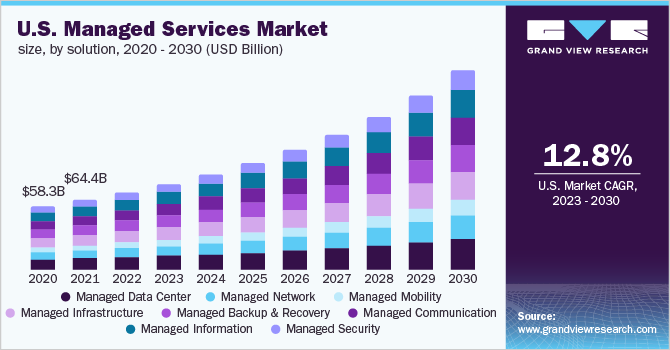The realm of information technology (IT) can be a complex labyrinth for businesses to navigate. Enter managed IT services, a business’s best friend in the world of tech.
What are managed IT services? In the words of Christian Hernandez , President of JCM Telecom, “Managed IT services are here to ensure smooth sailing for your business’s tech infrastructure and operations amidst a dynamic and often turbulent digital landscape.”
In this blog, we’ll seek to establish a clear managed IT services definition, explaining how managed services work and why your business needs them! Read on to learn more.
What Are Managed IT Services? Defining their Purpose
First things first: what are managed IT services? Managed IT, by definition, refers to a third-party provider, also known as a managed services provider (MSP), taking responsibility for your company’s IT infrastructure on a proactive basis.
This outsourcing approach allows businesses to concentrate on their core offerings and objectives without being bogged down by the complexities of IT management. As we step into 2023, the market for managed IT services is seeing significant growth, reflecting the rising demand across industries.
According to the market research firm Grand View Research , the global managed services market size is expected to reach USD 356.24 billion by 2025, growing at a CAGR of 11.5% from 2021 to 2025. The surge in demand is due to a multitude of factors, including the need for businesses to reduce operational costs, increase efficiency, and navigate the ever-evolving landscape of digital transformation.

Let’s explore managed IT services’ meaning in closer detail by taking a look at some of the services typically offered and how managed services work.
How Managed Services Work: A General Breakdown
Managed IT services work under a contractual agreement, where businesses enlist an external provider to handle their IT needs. What is the IT managed service provider’s role in your business’ success?
The service provider (or MSP) essentially monitors, manages and maintains the IT infrastructure, keeping your systems up-to-date and ensuring they operate at peak efficiency. It’s akin to having a full-time IT staff but without significant overhead costs. The scope of services provided under managed IT services is broad and often customizable according to individual business needs.
What managed services are included will typically depend on the unique requirements of an organization, but some common ones include:
- Network administration
- Cyber security services
- Backup and disaster recovery
- Cloud computing services
- Remote monitoring and management
- Software/technical support
- Hardware maintenance
- Helpdesk services
- IT support
- IT consulting
- And more information technology services
Let’s take a look at what managed services are best suited for your business by exploring them in closer detail.
Different Types of Managed IT Services: A Closer Look
1. Network Administration: Ensuring seamless connectivity and communication, network administration includes managing routers, switches, firewalls, and other networking devices. It’s all about keeping your organization interconnected and data flowing smoothly.
2.Cybersecurity Measures: This involves protecting your digital assets from threats, including intrusion detection and prevention, firewall management, and secure VPN access for remote workers. A robust cybersecurity strategy is an essential shield in the digital world – especially today where the average cyber attack sends over 60% of SMBs out of operation.
Fortify Your Digital Network with 24/7 Monitoring
Learn more about how we can help keep your it systems secure
3. Data Backup and Recovery: Vital to any business, this service includes backing up data to secure servers and restoring it when needed. It’s an insurance policy against data loss due to hardware failures, accidental deletions, or cyberattacks.
4. Cloud Services: Managed cloud services can handle everything from cloud migration to managing and optimizing your cloud environment. This ensures scalable, flexible, and secure access to data and applications.
5. Software Support and Maintenance: This includes managing software installations, updates, and patches to ensure your applications are always up-to-date, secure, and running efficiently.
6. Helpdesk Services: Providing immediate assistance to end-users facing technical issues, helpdesk services offer invaluable support that enhances productivity and satisfaction.
7. Strategic IT Consulting: A service that helps businesses make informed decisions about IT infrastructure and strategy. This includes planning for tech upgrades, budgeting, and advice on harnessing new technologies to spur growth.
Check out these additional resources to learn more about managed IT services: |
Main Takeaways: Why Your Business Needs Managed IT Services
Now that we’ve established a clear managed IT services definition and what types of managed services are offered by IT companies, let’s take a look at some of the benefits they can bring to your business.
1. Focus on Core Operations: By offloading IT responsibilities, businesses can direct their attention towards their primary goals, encouraging growth and progress.
2. Cost-Effectiveness: With no need to maintain an internal IT department or hefty tech infrastructure, managed services offer a budget-friendly alternative.
3. Expertise & Advanced Technologies: Access to specialized knowledge and cutting-edge solutions ensures businesses remain competitive and efficient.
4. 24/7 Support: Constant surveillance minimizes downtime, offering swift solutions to IT issues and maintaining productivity.
5. Scalability: As a business expands, IT support can be adapted to match the growth, offering a flexible, future-proof solution.
With over 92% of G2000 organizations seeking to leverage these benefits, it may be time for you to consider outsourcing your IT services as well.
Scale Your IT Operations with JCM Telecom: |

Why Choose JCM Telecom?
JCM Telecom’s seasoned expertise, comprehensive services, and customer-focused approach ensure your business can effectively navigate the complex digital terrain.
With us, you gain a trusted partner committed to your technological success and business growth – get in touch to learn more!
